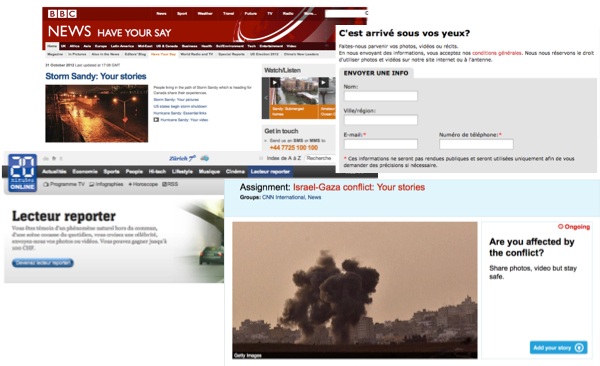Posts Tagged crowdsourcing
Crowdsourcing: how is this concept applied to journalism?
Posted by celinebilardo in Technology on November 27, 2012
With the rise of the Web 2.0, more and more people get to express themselves on the Internet: by contributing to a personal blog, answering to a poll on a website or making comments on any event the web is talking about. Today, those contributions can be neatly managed by news organisations to make you participate to their news production. And this is the object of this blog’s entry: crowdsourcing the news.
The crowd likes to be involved
Jeff Howe is the man who coined the term “crowdsourcing” in 2006 in an article called “The Rise of crowdsourcing.” At the time he was a contributing editor of the Wired magazine. Now he tends to be perceived as The Crowdsourcing expert. But you may wonder…
What is crowdsourcing?
As Jeff Howe well expressed it, crowdsourcing is a process of involving the public, the crowd, into a task by an open call. And this process if often made through a website. The definition could include many sorts of calls, indeed. To a large extent, crowdsourcing can be applied to solving a scientific problem, as the company InnoCentive started to do in 2001, or as IStockphotos managed in outsourcing the task of photographing an event to a voluntary crowd instead of hiring a professional photographer for instance.
Crowdsourcing takes many forms. But one thing makes it unique: it empowers the crowd. As the crowd represents different brains, different competences, it can be even more creative, efficient, innovative and influent than a single man working in his office on a task he has no grasp into.
How news organisations make the most of it?
In the context of Journalism, you can well imagine that the journalist and the news organisation one can work for were primarily the only gatekeepers of news, and you were waiting for them to be informed. If there was a place for you to communicate with the newspaper, there was the “letters to the editor”, and not many more.
Today news organisations have their websites. Moreover, if you give a closer look to them, you will notice they even make a space for you to act and communicate. Not by solely adding comments. There is more!
In England, the BBC has launched Have your Say ; in the USA, CNN opened iReport. And the Swiss news organisations are not the last: The RTS has Vos infos and The 20minutes has the Lecteur-Reporter’s platform. All fell in the new trend. They all let you the chance to be part of their work, or in other words: now the news need you.
As a million of events happen across the world, reporters and journalists cannot cover them all. This is where the audience is powerful: it can improve their coverage.
When terrorists set off a series of bombs on buses and subways in London, who produced the most riveting images and sound bites? The passengers and their cell phones.” [1] When an accident occur next to your home, or on your way to work, you are the first witness of the event and no professional reporter could catch the same tension you were able to grasp when it happens.
With a single photo, a video, a short message, you can make a newsroom get up. You can even make it change its editorial agenda.
For Bernard Rappaz, Editor in chief at the RTS in Switzerland, crowdsourcing makes a news media quicker than before. Using Twitter, Facebook, and their crowdsourcing tool on their website, the members of the newsroom can compete with the news agencies they are sometimes dependent on. As Mathieu Coutaz confirms himself: it allows the staff to be the first on the scene and to be always closer to the stories that interest the people their work for.
Mathieu Coutaz is the content manager for 20minutes online in the French-speaking part of Switzerland. The 20minutes is The daily newspaper distributed in Switzerland and this, for free. Its platform “lecteur-reporteur” has been launched in 2006 and the newspaper rewards any contributions that it eventually publishes on its web. What is most, “50% to 70% of the contributions that are selected go on the print edition” Mathieu Coutaz explains. And he emphasises one fundamental point that cannot be neglected: your photos and stories go through a process of verification before getting anything done. “When verified, the contributions of the audience can influence the editorial agenda on the temporal and hierarchical aspects. If it has to be treated before another news, and if the story is worth being published at the top of our agenda, then of course we do it.”
For the one that may want to ask: But isn’t it citizen journalism? In fact, no it isn’t. Robert Niles states this argument in his “Journalist’s guide to crowdsourcing”:
Crowdsourcing does not ask readers to become anything more than what they’ve always been: eyewitness to their daily lives.
In that sense the news organisations save their first role of gatekeepers: the readers don’t write the stories, they only contribute to it: the final decision of its treatement and broadcast still lies in the professional’s hands.
Crowdsourcing at risks
In an interesting article, Darren Gilbert warns that “crowdsourcing can be as advantageous as it can be dangerous.” Although readers are willing to contribute to the news, some are able to get a journalist on the wrong track. He takes the example of a recent scandal that occurred in the United States: a company named Journatic published news gathered from the public. And there were actually wrong!
In Switzerland, all the news platforms I discovered ask for the name and mail address of the contributors, in order to be able to get back to him/her. A mail address can be fake, indeed, but in any case, Swiss news organsations do the verification before publishing, which can avoid some serious faux pas.
To cope it all, crowdsourcing may well bring the public and the news organisation closer than before. It may establish a new relationship between the public and the news media: a trust that could have been lost. But it still needs to be well used in order not to lose what crowdsourcing is for journalism: a relevant tool to make the crowd part of the work, for a better and substantial result.
I am now turning to you
Have you ever contributed to the news of your local newspaper?
What do you think of the crowdsourcing concept regarding journalism?
And to go further…
A new trend in crowdsourcing is for journalists to use special crowdsourcing platforms to gather the information they couldn’t find from their places, such as Ushahidi‘s platform, specialised in mapping crowdsourcing information.
The TED talks also got into the crowdsourcing concept, here is a talk held by Paul Lewis about the impact of crowdsourcing the news for investigative journalism.
And to be always up to date with the last seminars about crowdsourcing and journalism, have a look at the European Journalism Center’s website, it’s worth it!
By Céline Bilardo
[1] Howe, J. 2008. Crowdsourcing: Why the power of the crowd is driving the future of business. 1st ed. USA: Ed.Crown Business. p.212.
Facebook as a journalistic tool
Posted by emilienasel in Technology on November 25, 2012
Facebook is becoming an increasingly popular tool in media circles opening up a wide scope of new interactivity. Let’s take a look at how journalists use this social network as a part of their work.
My parents have often said that Facebook is useless. Well, they couldn’t be more wrong! Since its launch in 2004, more and more journalists use it as a professional tool. Through profiles and pages that I have looked at, I analyzed how journalists use Facebook.
Two uses for the journalists
Firstly a very valuable journalistic use of this social network is crowdsourcing. Many journalists seek interaction with the public by asking their fans for their opinion on current issues. This enables them to get large numbers of answers in record time. One of the most active journalists in the field is probably Nicholas Kristof, columnist for The New York Times, who posts articles or news links several times a week while asking his reader to give their opinion.
 |
 |
While browsing on Facebook, it is obvious that news is everywhere. The interaction of the users within the social network allows journalists to find which topics of interest or concern attract people. David Abiker, a radio columnist at France Info, confirmed in an interview for journ@lism.info: “Sometimes, my friends offer me news or a buzz to treat. In this case, Facebook can become a source of information. Facebook allows you to see how people react to new items.” (Read the entire interview here.)
Secondly, Facebook is very useful when looking for testimonies. This practice ca be observed in different countries. In Switzerland, Darius Rochebin, a RTS journalist, is very active on his account: “Facebook is valuable when we are trying to find a testimony. Links can be made between Facebook friends and potential witnesses.”
In France, David Abiker also uses this method:
“Facebook allows me to find experts or witnesses. So when I need a particular guest, I post something like this: “David Abiker is looking for a sports psychologist”, or “David Abiker is looking for an Internet specialist”, and it works pretty well.“
In the United States, Lisa Eckelbecker, a reporter for the Worcester Telegram & Gazette, also uses Facebook to search for testimonies: “Recently, I asked my Massachusetts friends if they could help me find sources for a story on supermarket retailing.“
Facebook is a very useful tool in journalism because it is a huge time-saver when it comes to looking for evidence. Darius Rochebin explains: “What used to take two or three hours, now takes only few minutes. Before, it was often necessary to make dozens of phone calls to reach the person you wanted. Now, thanks to mutual friends, in a few clicks you can find what you are looking for.“
Mark Zuckerberg is now friend with journalists
If journalists are now becoming increasingly aware of the potential that Facebook offers them in their work, Mark Zuckerberg’s team has been developing a strategy to attract more journalists since 2011. In April 2011, the social network launched its page “Journalists on Facebook“. The purpose of this page was to make Facebook more popular with journalists, in particular with a search engine of sources.
(Video of Mashable with Vadim Lavrusik, journalism program manager at Facebook)
In the meantime, Facebook launched a survey among journalists giving rise to five elements encouraging them to use Facebook more efficiently :
- Posts which include questions lead to an increase of “like” of 15%.
- Posts with a photo or a link collect 50% of more “likes”.
- Internet users comment more frequently posts published on Thursday, Fridays, Saturdays and Sundays, in the early morning (between 7am and 8am), at the end of the day or late in the evening.
- Personal thoughts included in the publication generate a higher click rate than a classical post.
- Topics about education, politics or journalistic analysis get more feedback than others.
(Read the entire conclusions of the survey here.)
To conclude, my parents were indeed wrong: Facebook can be useful in some areas. Mark Zuckerberg’s site has now became essential for most journalists. Even Darius Rochebin admits:
“In my opinion, journalists who refuse to use Facebook are making a big mistake. Personally, I could not do without it, it has become an absolute necessity.“
But, will Facebook, like Twitter, gradually become a site for professionals rather than for private users?





